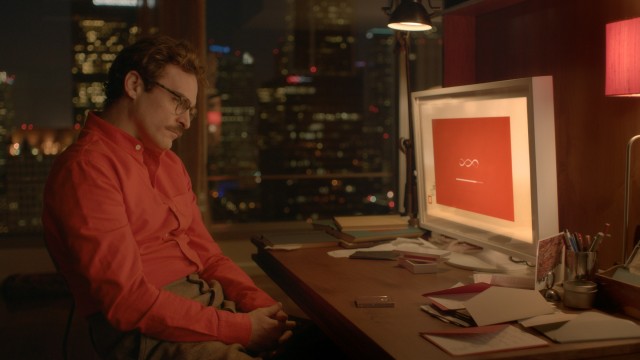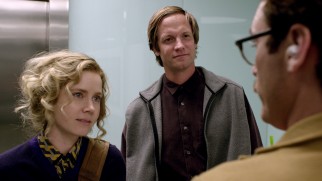Her Movie Review
 |
Her
Theatrical Release: December 18, 2013 / Running Time: 126 Minutes / Rating: R Writer/Director: Spike Jonze Cast: Joaquin Phoenix (Theodore Twombly), Scarlett Johansson (Samantha), Amy Adams (Amy), Rooney Mara (Catherine), Olivia Wilde (Blind Date), Chris Pratt (Paul), Matt Letscher (Charles), Sam Jaeger (Dr. Johnson), Luka Jones (Mark Lewman), Portia Doubleday (Surrogate Date Isabella), Bill Hader (Chat Room Friend #2), Kristen Wiig (SexyKitten), Adam Spiegel (Alien Child), Brian Cox (Alan Watts), SoKo (Voice of Isabella), Evelyn Edwards (Mother Who Dated Pricks), Steve Zissis (New Sweet Boyfriend of Mother Who Dated Pricks) |
Spike Jonze adds another creative comedy to his résumé in Her, a film that also represents the first original feature screenplay from the director of Adaptation, Set in the near-future, Her centers on the relationship between a lonely man and his computer's operating system. Though that could be the foundation for some high concept science fiction, Jonze instead makes it a real and relatable exploration of romance, the human condition, and, to a smaller degree, the growing presence of technology in our lives.
Theodore Twombly (Joaquin Phoenix) works at a company that pens personal "handwritten" (not really) love letters for a fee. Theodore has a flair for his work, but his own experiences with love are not as heartwarming. He is soon to divorce a wife (Rooney Mara) from whom he has long been separated. His life is filled with kinky erotic phone calls and video games more interactive than ours. Into this depressing existence comes Samantha, the name that his new computer's state-of-the-art operating system gives itself.
Samantha represents cutting-edge artificial intelligence. She speaks with a perfectly human-like female voice (that of Scarlett Johansson) and exhibits personality and emotions just like a human. Samantha quickly declutters Theodore's inbox and dutifully reminds him of scheduled meetings. But she's more than just a personal assistant. She tucks Theodore in at night, sees what he points his tiny, all-purpose phone's camera at, and engages him in the most meaningful conversations he has.
Before long, Theodore is calling Samantha his girlfriend and sharing innermost thoughts and intimate experiences with this unseen companion. The relationship isn't without some limitations; Samantha's request to use a sexual surrogate goes all wrong, for instance. But this relationship seems to be both mentally and emotionally fulfilling for both parties.
You can be sure that Jonze, who helmed music videos throughout the '90s before making his feature debut on Malkovich, infuses Her with directorial style and technical pizzazz. But style and pizzazz alone do not keep viewers thinking about a movie. Story and characters do and it is in these areas where Her excels. Jonze manages to invent something utterly original, but make it feel organic and genuine. Films tend to depict a dystopian future and though you can classify Her's unspecified setting as that, it's believable and any social commentary is secondary to this unusual love story. Jonze is not the first to recognize the growing reliance on technological devices or the corresponding drop in human interaction, but he's one of the first to find real beauty and poetry in it.
Jonze gives us a near-future Los Angeles with striking architecture where everyone seems to walk around talking to someone or something Much of the film plays out with Theodore simply talking to his unseen love. Their talks range from deeply philosophical to routine lovers' spats. That design might get old or tiresome, but Jonze gives both characters dialogue worth speaking and the actors compellingly bring it to life, with Phoenix doing the visual acting for two. The film makes this utterly preposterous premise (man in love with computer) seem absolutely viable as it marginalizes the physical aspects of romance next to mental stimulation and basic relating.
Her gives you plenty to ponder regarding the nature of love and of modern living. That it can do so without being enamored of its ideas or going off the deep end is no small achievement. For all its acclaim, Malkovich does go off the rails at points. Adaptation, also written by Charlie Kaufman, similarly runs out of charm with its reflexive Meta design overpowering everything else. With Her, Jonze manages to marry his confident rhythm and splendor to a more resonant and consistent script of his own. It's more on the order of Kaufman's Eternal Sunshine of the Spotless Mind or of Richard Linklater's Before films with its intellectual/sensory exploration and celebration of life's most fundamental and confounding emotion.
After opening in six New York and Los Angeles theaters on December 18th and raising its theater count to 47 a week later, Her expands to nationwide release today in a modest 1,700 venues. It's a film that demands strong reviews and favorable word of mouth. Jonze's past films have gotten their share of both, but still run into commercial ceilings, as evidenced by the precipitous weekly drops of Where the Wild Things Are. Buoyed by awards and acclaim, Her should do decent business, though it's sure to be too strange for some moviegoers, with its pin drop moments of bared emotions and blank screen orgasms.
|
Related Reviews:
DVDizzy.com | DVD and Blu-ray Reviews | New and Upcoming DVD & Blu-ray Schedule | Upcoming Cover Art | Search This Site
Oscar Contenders: Before Midnight Gravity American Hustle Nebraska Captain Phillips August: Osage County
Directed by Spike Jonze: Being John Malkovich Where the Wild Things Are
Joaquin Phoenix: The Master Ladder 49 Brother Bear The Village
Amy Adams: Doubt Trouble with the Curve Julie & Julia Man of Steel The Muppets The Fighter
Scarlett Johansson: We Bought a Zoo Chasing Ice The Other Boleyn Girl The Spirit He's Just Not That Into You
Olivia Wilde: In Time Butter People Like Us The Words The Incredible Burt Wonderstone


